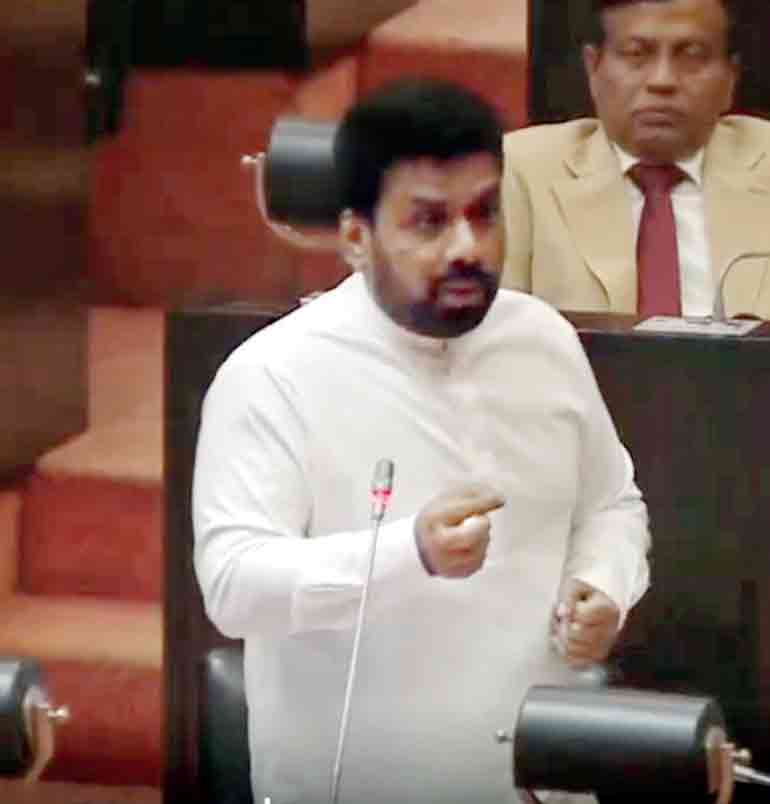Sunday Feb 22, 2026
Sunday Feb 22, 2026
Wednesday, 19 November 2025 00:10 - - {{hitsCtrl.values.hits}}

President Anura Kumara Dissanayake
President Anura Kumara Dissanayake yesterday told Parliament that Sri Lanka’s present and future political agendas “will not be written on the basis of racism”, warning that defeated political forces are seeking to manufacture communal tensions as other lines of attack against the Government lose traction.
Speaking during the debate on the expenditure heads of the Ministry of Defence and the Ministry of Public Security, the President said opportunistic groups were attempting to turn recent incidents, including the dispute over a Buddha statue at a Trincomalee coastal site, into “old racist dramas” despite the underlying administrative and legal issues being addressed.
He said he had instructed the Secretary to the Ministry of Public Security to submit a report on the Trincomalee incident and outlined the sequence of events leading up to the confrontation. According to the President, the site in question had been operated as a canteen despite a previous permit issued in 2014, and the Coast Conservation Department had ordered the removal of unauthorised structures. An appeal to the Environment Ministry failed, and a further extension sought by monks to go before the Court of Appeal expired on 14 November, two days before tensions flared.
Dissanayake said the Buddha statue was temporarily moved to the police station for security reasons, but was later returned to the site with security provided, to avoid the next flashpoint becoming a confrontation between police and nationalist groups. The matter is now before court, with an interim order preventing both new construction and the demolition of existing structures until the land is properly surveyed and demarcated between the Coast Conservation area and the temple.
“The issue is resolved in terms of process. What is now going on is arson by opportunistic groups,” he said, adding that the Buddhist majority and Hindu, Muslim and Catholic communities would not allow racism or communal agitation to define the country’s trajectory.
The President argued that previous Governments had collapsed over corruption, democratic failings or economic crises, but said those accusations could not be levelled at the current administration. He claimed that in the absence of a “constructive slogan”, defeated political forces were turning to ethnic mobilisation and attacks on law-enforcement and public security officials.
On reconciliation, Dissanayake said the Government’s approach rested on four linked pillars: Truth-seeking, justice, compensation and guarantees of non-recurrence. He pledged to pursue investigations into emblematic cases, including the disappearance of 11 students allegedly involving naval personnel, the killings of journalist Lasantha Wickrematunge and ruggerite Wasim Thajudeen, the disappearance of Prageeth Ekneligoda and the 2019 Easter Sunday attacks.
He insisted these inquiries should not be branded a “hunt for war heroes”, saying the objective was to isolate and punish individuals responsible for crimes so that the institutions they served, including the Navy, military intelligence and other security arms, could be cleared of collective suspicion. He said investigations would be conducted under judicial supervision, with due process and legal protections for the accused, but with a clear intent to secure convictions where evidence supported charges.
The President also referred to recent discoveries of suspected mass burial sites, noting that instead of appointing political commissions, the government had placed investigations under court orders and specialist teams. He said the state “needs a voice for justice” and that the pursuit of justice would be carried out without political interference.
On defence policy, Dissanayake said the Government did not foresee a return to full-scale internal civil conflict or conventional invasion scenarios, and was restructuring the armed forces to address threats in cyberspace, technology, maritime security and airspace. He detailed recent and upcoming military support, including about 70 jeeps from India, plans for a military academy, 10 TH-57 helicopters from the United States in 2026, two C-130 aircraft from the US and Australia in 2026 and 2027, and Beechcraft aircraft already received. Existing helicopter fleets are to be refurbished under ongoing tenders.
He framed these steps as part of building a “modern and efficient” military aligned with current and emerging threats rather than the conflicts of the past.
The President devoted a substantial part of his speech to the Government’s campaign against narcotics and organised crime. He traced the evolution of local thuggery and small-time criminality into a national and international network linking drug traffickers, armed gangs, politicians, corrupt officials, sections of the bureaucracy and parts of the media. He said the underworld had historically been protected and weaponised by political actors to entrench power in local communities.
Dissanayake said the current public security operation targets this network and is receiving strong public backing, but claimed that some opposition politicians were working against it and seeking to discredit the officials leading the crackdown.
He strongly defended Public Security Ministry Secretary Ravi Seneviratne, senior CID officers such as Shani Abeysekara, the Inspector General of Police and other officials facing political attacks, characterising criticism of them as aligning with criminals and corrupt interests. Parliament, he said, had a responsibility to protect disciplined and independent public servants who took risks to enforce the law.
Concluding, Dissanayake reiterated that the Government would not allow racial conflict to re-emerge and announced plans to hold a “Sri Lanka Day” for ethnic harmony in December, with participation from political representatives of all communities and programs to deepen cultural exchange between regions.